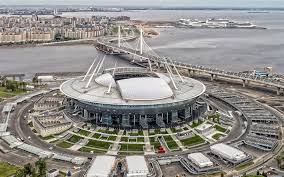It may be unprecedented for a city which stages the World Cup to host the subsequent European Championships but St. Petersburg is gearing up once again to take centre stage with three group games and a quarterfinal of the pan-European 2020 finals. In his second report from Russia, Andrew Warshaw reports from a city that promises to rekindle memories of the riveting atmosphere that pervaded last year’s global competition.
Russia’s so-called second city may only average 60 days of sunshine a year, according to local guides, but its rich cultural heritage and infectious hospitality makes it a beguiling and captivating venue for fans of whichever country ends up playing there along with the host nation who qualified in second place behind Belgium in their group.
As imposing stadiums go, few are as impressive as the Krestovsky Stadium, more commonly known as Gazprom Arena, where France played Belgium in the World Cup semi-final and which serves as home to Zenit St Petersburg.
Vladimir Litvinov, the stadium’s general manager, admits that its retractable roof and pitch pose particular challenges, particularly when it comes to insulation and grass quality, but says any residual problems will be ironed out by next summer.
“We have certainly not rested on our laurels after the World Cup,” Litvinoc told a group of western reporters last week. “We are making small improvements here and there but we will be more than ready.”
Just as at the World Cup, organisers are implementing a FAN ID system that will allow ticket-holders to enter the country without visas while there will free public transport in and around the city on match days.
Alexey Sorokin, the public face of the 2018 World Cup organising committee who is now running the St. Petersburg Euro show, says part-hosting next summer’s tournament is a natural extension of the legacy produced by the World Cup.
“I don’t think the World Cup has significantly changed the image of Russia per se,” says Sorokin, “but what it did do is open up that image and allowed many people to discover the true Russia rather than the one they may have read or heard about.”
But it isn’t all sweetness and light.
During a media conference with Sorokin, he was inevitably asked about the latest reports claiming Russia could be thrown out of the Euros due to alleged inconsistencies in anti-doping data.
The country’s anti-doping agency is expected to be declared non-compliant when the World Anti-Doping Agency’s executive meet on December 9 to discuss the issue.
Sorokin was at pains to distance himself from the controversy, focussing instead on the record of the country’s footballers.
“For us as organisers we have not had any issues with doping. During the World Cup our team was tested multiple times and everyone was clean. But in all honestly, the ongoing (Wada) case is not my domain.”
Sorokin, understandably is more keen to focus on how St Petersburg will be perceived and, in particular, the chances of the national team.
Before the World Cup, Russia were derided as one of the weakest hosts of recent years amid fears they could be quickly eliminated. They proved everyone wrong by reaching the last eight – the first time that had happened since forming part of the Soviet Union in 1970. Suddenly the country once again fell in love with football.
“It certainly raised the enthusiasm levels,” said Sorokin. “The national team had to encounter difficult times, in particular certain attitudes towards them. But they showed they could buckle up and they created a new image, one of playing for the fans rather than the fans existing for them.”
Much has been made of the potential logistical nightmare of millions of fans criss-crossing Europe to watch their teams at 12 different venues next summer. But Sorokin believes the concerns have been overblown.
“I wouldn’t worry too much about travel time. In Japan and Korea at the 2002 World Cup and in Brazil in 2014, some of the distances were far greater.”
“What this Euros does is give a great opportunity for individual cities whose countries are not able to organise an entire competition to showcase what they have to offer.”
Contact the writer of this story at moc.l1745125383labto1745125383ofdlr1745125383owedi1745125383sni@w1745125383ahsra1745125383w.wer1745125383dna1745125383

